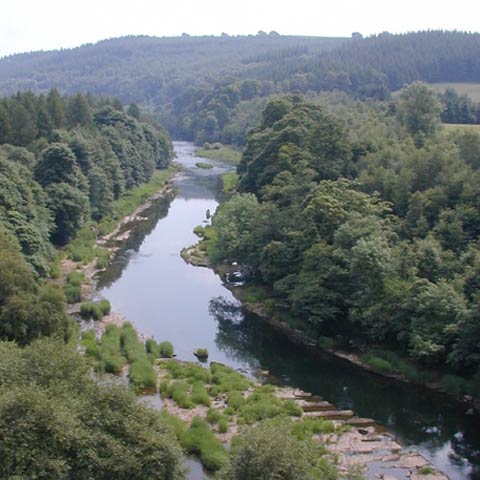New water quality science paves the way for improving river health in the UK

A new river monitoring system to assist local communities to improve water quality of the River Eden and its tributaries is now online.
Researchers from Lancaster University, Newcastle University, Durham University, the Centre for Hydrology and Ecology, Askham Bryan College (Newton Rigg) and the Eden Rivers Trust have installed ten river monitoring stations to collect valuable data on river water quality that is available to farmers, local communities and anyone interested.
The research is part of the Defra-funded Eden Demonstration Test Catchment (EdenDTC), one of three national projects to understand how land management affects the water environment and to test measures for reducing agricultural pollution.
The live, real-time data, made available via the web, can be used by councils, rivers trusts and the public to help in understanding how to improve river water quality where they live. EdenDTC is one of the first projects of its kind to provide live data on river water quality to the public, setting a national standard for managing diffuse pollution in rivers throughout the UK.
Water pollution from agriculture can arise from artificial fertilisers, livestock manures or soil erosion and is strongly affected by the way the soil is managed. By monitoring water quality in the River Eden, communities will be able to stay better informed about the issues affecting their local river, so they can make decisions about how to tackle them.
Professor Phil Haygarth, co-Director of the Centre for Sustainable Water Management at Lancaster University, who is leading the project, said: ‘Along with installing state-of-the art, up-to-the-minute, high frequency monitoring equipment, EdenDTC is providing a platform for scientists, farmers and the wider community to come together and learn about this place -- the River Eden. This project is among the first of a new type of integrated river monitoring and social science being done in the UK’.
Farmers will find the river water monitoring system useful as it provides them with a way to see how much of an effect the use of fertilisers have on river water quality, helping them develop a strategy to minimise the impacts of agriculture on rivers in the Eden catchment. Using data from the Eden DTC water monitoring stations and the knowledge that is built up through the project can help farmers find the strategies that work best for their specific circumstances.
Stephen Carruthers from Towcett Farm in Penrith, Cumbria who participates in the Eden DTC project said: ‘As a farmer if I can find ways to raise cattle and grow crops very efficiently with no detriment to the water quality or the local habitat, this is the way forward.
All farmers have problems on the farm with a slight bit of pollution and if you can find ways to help eliminate it, it’s always a good thing. We’ve been trying hard to monitor the Eden and clean it up because it’s one of the most special rivers in the UK and Europe for wildlife’.
Dr Sim Reaney, a researcher in Durham University’s Institute of Hazard, Risk and Resilience, who also leads the project, said: `The key thing about the EdenDTC is the openness and transparency of the science, the fact that the data is up there on the web, freely open to anyone who wants it. That’s a big change from the past, where the data was locked up and not fully utilised’.
While the water of rivers may often look clean, there are a range of nutrients from agricultural runoff that simply cannot be detected by the human eye. The amount of nutrients, such as nitrogen and phosphorous, in rivers and groundwater often changes rapidly and goes undetected. The Eden DTC water stations, however, will analyse nutrients in the river catchment every 15 minutes to help researchers and communities understand when rivers are at risk. The project will allow communities to be better informed, therefore more self-governing in dealing with environmental decisions that can affect river water quality.
Professor Bob Harris, co-ordinator of the three national Demonstration Test Catchments Projects said: ‘We will be able to use the scientific evidence gathered in the Eden catchment and elsewhere to show how small changes in farming activities adopted throughout the country can lead to quite an improvement in our water quality without negatively affecting food productivity.
We want to develop win/win situations whereby farmers manage their land to produce food profitably, but become better at preserving topsoil and reducing their nutrient losses. This will benefit the water environment because not as much pollution is entering rivers and groundwater, but also saves the farmer money’.
Richard Benyon, Parliamentary Under-Secretary for Natural Environment and Fisheries said ‘Communities, farmers and land managers all want improved water quality and this project on the River Eden will make it much easier to identify the problems and how to deal with them’.
The Eden DTC is aligned with a recent framework developed by the European Commission (EC) to improve river water quality in the European Union through citizen action.
Data from the EdenDTC water quality monitoring system is available via its website at http://www.edendtc.org.uk/.